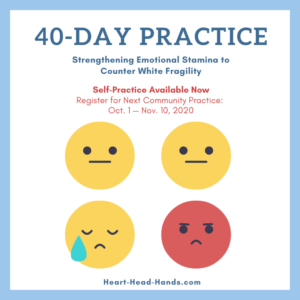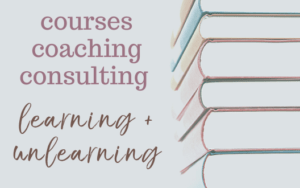This course supports self-inquiry, asking how we can better act on commitments to social, racial, and environmental justice.
Description
- What does it mean to strive for justice in everyday life?
- How do I act on commitments to social, racial, and environmental justice?
- How do I build reflective self-work into my life in more intentional, ongoing ways?
This course supports you in answering these questions through offering 40 questions that involve deep-diving into conditioned ways of living, being, and intervening in the world.
Too often, life speeds by without us taking the time to ask tough questions. Yet, we know that self-work is critical to the work of social justice. There’s always more to learn and unlearn, to revisit and rethink about our ways of showing up and striving for justice.
This course ties the process of slowing down for self-work with walking—literal or metaphorical—which invites us to think in full-body ways, considering the heart, head, and hands.
Walking itself isn’t required. You might integrate questions into a guided meditation practice or journal in outdoor spaces. There are many ways to engage.
Because this course is self-paced, you could take it a day at a time, take extended time with any question, and listen to what your body wants and needs.
What does this course include?
- 40 questions that invite a range of self-inquiry and self-work to enhance and make actionable commitments to justice.
- A downloadable journal for recording answers and tracking reflection related to these questions.
- Guided walking meditation to accompany the self-inquiry practice.
- Curated blog posts to frame self-work and share how the metaphors of “walking,” “pathways,” and “steps” fit into justice-oriented movements.
- A resource guide with links to podcasts and audiobooks that may be listened to while walking.
What will these 40 questions entail?
These 40 questions provide structure and invite attention to a wide range of matters that factor into everyday life, yet may be easily taken-for-granted or overlooked as important to social, racial, and environmental justice.
Among the 40 questions are ones about early and recent experiences of witnessing injustice; of learning about one’s social positions (race, class, gender, and more); and of recognizing belonging and not-belonging. These questions involve looking backward into what we’ve inherited, experienced, and been conditioned into as well as looking forward into what we can feel, think, and do at this time.
Using the four themes of America’s Black Holocaust Museum, these questions invite attention to remembering, resisting, redeeming, and reconciling with much injustice, including histories of enslavement, genocide, colonization, and forced/blocked immigration in the United States.
Together, these questions invite the intrapersonal self-work that can motivate and be used to fuel important interpersonal work-with-others and institutional work-within-institutions.
What is the cost?
The cost is $40, which is priced to make this content widely accessible.
Group discounts are also available.
Why work with Beth?
Beth is a researcher and educator (previously tenured professor and current entrepreneur) who has deep commitments to social and racial justice and embraces imperfection while striving for justice.
Across teaching and research, Beth centers issues of (in)justice, (in)equity, power, agency, and rights. Beth has collaborated with people in and out of academia, including with the YWCA Southeast Wisconsin’s Racial Justice Program, America’s Black Holocaust Museum, and participants in e-courses such as “Strengthening Emotional Literacies to Counter White Fragility” and “Career Discernment for Academics: Aligning Career with Commitments.”
Beth’s teaching experience involves years of centering embodied experiences, using contemplative practices, and working one-with-one.
Beth also values ongoing self-work, looking regularly at personal questions of internalized inferiority and supremacy and asking about complicity with whiteness and white supremacy.
What accessibility considerations are addressed?
- All materials are provided in written form, and images include alt-text.
- One-with-one coaching sessions will be recorded using Zoom for slowing down and playing back each conversation.
- Though the course encourages walking, there are other ways to engage, depending on what your body needs. These include integrating questions into a guided meditation practice or daily journaling in outdoor spaces, among others.
- There’s always a risk of reproducing ableism whenever physical activities are involved, so there are questions about de-centering what’s perceived as “normative,” including embodied experiences.
- If you have other suggestions or particular accessibility considerations, please also reach out. Thanks!
Is this course right for me?





